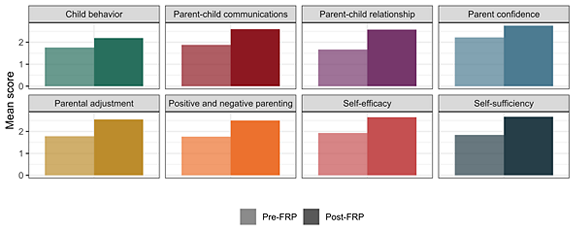A Family Resiliency Program Helps Parents Feel Capable & Confident

Part of our Goal: Resilience collection, where NORC researchers share insights from their work in support of human resilience.
Author
Elizabeth Mumford
Senior Fellow, Public Health
December 2023
Supportive, resilient families are essential to fostering children’s healthy development, and positive parenting has widespread support as an effective approach.
As a parent, I valued my early introduction to positive parenting through Faber & Mazlish’s How to Talk So Kids Will Listen & Listen So Kids Will Talk (if you prefer a quick summary, check out this video). And—full disclosure—as a new mother, I participated in a parenting class run by the Maryland-based nonprofit Parent Encouragement Program (PEP) over 20 years ago.
When PEP asked for NORC’s help determining the impact of their Family Resilience Program (FRP), my natural instinct as a researcher kicked in. I really wanted to know whether the FRP that PEP is fielding now (not quite the same as the program I participated in 20 years ago) would be helpful to participants.
Knowing that we would be very direct with PEP, no matter what the findings, we designed a pilot evaluation study to obtain preliminary outcome results. The retrospective pre-post-test design of our FRP evaluation asked participants to rate various items both pre-FRP and post-FRP.
PEP’s Family Resilience Program consists of a series of classes designed to help parents and caregivers create a supportive environment in which to raise children. To evaluate the program’s outcomes, NORC worked with PEP to strengthen the program logic model and develop a survey (translated into multiple languages) reflecting the target outcomes. Given the various levels of literacy in the participating populations, we had a range of key collaborators evaluate the language and format of the survey instrument. On top of that, PEP staff provided read-aloud (of survey items) support in a classroom setting for individual web-based responses to the survey.
Our findings reflect participating parents’ and caregivers’ self-reported assessments of their parenting experiences from before their program participation and after their final FRP class. The program outcome reflected these constructs: Parent-Child Relationship, Parent Confidence and Knowledge in Involvement with Child’s Schoolwork, Parent Report on Child Behavior, Parent-Child Communications, Self-Sufficiency, Self-Efficacy, Positive and Negative Parenting, and Parental Adjustment. We measured the responses on one of three different 4-point Likert scales: Strongly Disagree/Strongly Agree, Not at All/Very Much, or Never/Usually.
Pilot Results
- Benefits to parent-child relationships, such as how often parents tried to understand their child’s point of view
- Greater parental confidence to be involved in and supportive of their child’s schoolwork, such as ensuring a supportive routine for homework
- Improvements in their child’s behavior, such as using constructive, non-aggressive ways to solve problems
- More constructive parent-child communication, such as feeling like they could talk to their child on the child’s level
- Stronger feelings of parental self-sufficiency, such as feeling prepared to manage situations so their child feels seen and heard
- Enhanced parental self-efficacy, such as feeling confidence in themselves as parents
- Constructive movement towards positive parenting, such as engaging their child in finding solutions to problems
- Improvements in parental adjustment, such as feeling happy, satisfied, and coping with the emotional demands of parenting

Results
Our evaluation indicates a statistically significant improvement immediately after participation in FRP, not only across all scales but even across all individual items. In addition, the average effect size was almost universally large, corresponding to a shift in scale scores and reflecting perceived improvements across the eight parenting outcomes.
In sum, the pilot data provide preliminary indicators that FRP may yield substantial benefits for parents’ mental health, their self-sufficiency and self-efficacy as parents, the quality of communications with their children, and their child’s behavior, among other outcomes.
Main Takeaway
Family resilience benefits society, and PEP’s Family Resilience Program has preliminary evidence of positive outcomes for parents’ self-sufficiency and self-efficacy, the quality of their communications with their children, and their child’s behavior.
Next Steps
Keeping our objective distance as program evaluators, further research with a more rigorous, controlled design—i.e., a comparison population to be sure that FRP participants are not in some way uniquely poised for skill growth even without the FRP course exposure—is necessary to determine whether these improved parent-reported outcomes can be reliably attributed to the Family Resiliency Program.
Citation
Mumford, E.A. (2023, December 20). A Family Resiliency Program helps parents feel capable and confident. NORC at the University of Chicago. Retrieved from https://www.norc.org.







